Dec . 15, 2024 12:02 Back to list
cpvc tube
The Benefits and Applications of CPVC Tubing
Chlorinated Polyvinyl Chloride, commonly known as CPVC, has emerged as a popular choice in various piping systems due to its impressive durability, flexibility, and resistance to heat and corrosion. This thermoplastic material is an upgraded version of PVC, making it suitable for a wider range of applications, particularly in plumbing and industrial systems. In this article, we will explore the benefits and applications of CPVC tubing in modern infrastructure.
Advantages of CPVC Tubing
1. Corrosion Resistance One of the standout features of CPVC is its excellent resistance to corrosive substances. Unlike metal pipes, which can corrode and degrade over time when exposed to water or various chemicals, CPVC tubing is immune to such issues, ensuring a longer lifespan for your plumbing systems.
2. High Temperature Tolerance CPVC can withstand temperatures up to 200°F (93°C) and is suitable for hot water systems. This makes it an ideal choice for residential plumbing as well as industrial applications where high-temperature fluids are involved.
3. Lightweight and Easy to Install CPVC tubing is considerably lighter than traditional metal pipes, reducing transportation costs and making installation easier. It can be easily cut and joined using solvents or fittings, which simplifies the installation process.
4. Cost-Effective Although the initial cost of CPVC might be higher than some alternatives, its durability and longevity make it a cost-effective choice in the long run. The reduced maintenance costs and the elimination of corrosion-related replacements further enhance its economic viability.
5. Low Thermal Conductivity CPVC has low thermal conductivity, which helps maintain the temperature of the fluids within the pipes. This is particularly beneficial in hot water applications, where heat loss can occur.
Diverse Applications of CPVC Tubing
cpvc tube

CPVC tubing is versatile and finds applications across a range of industries
- Residential Plumbing In homes, CPVC is used for hot and cold water supply lines. Its resistance to high temperatures makes it a preferred choice for water heaters and other applications involving hot water.
- Industrial Processes Industries that handle corrosive chemicals utilize CPVC piping for fluid transfer and chemical drainage. Its ability to withstand harsh environments ensures operational efficiency and safety.
- Fire Sprinkler Systems Many fire protection systems incorporate CPVC due to its high-temperature tolerance and fire-resistant properties. CPVC piping is compliant with various fire safety regulations, making it a trusted choice in fire protection engineering.
- HVAC Systems In heating, ventilation, and air conditioning systems, CPVC is used for chilled and hot water piping. Its lightweight nature and resistance to corrosion enhance the efficiency of HVAC systems.
- Agriculture CPVC tubing is also employed in agricultural irrigation systems. Its durability and flexibility make it suitable for various outdoor installations, resulting in efficient water management in farming practices.
Conclusion
In conclusion, CPVC tubing offers a variety of benefits that make it an ideal choice for numerous applications in both residential and industrial settings. Its resistance to corrosion, high-temperature tolerance, and ease of installation contribute to its growing popularity in modern infrastructure. As industries continue to seek reliable and efficient piping solutions, CPVC is likely to play a significant role in shaping the future of plumbing and fluid management systems. Whether for hot water systems in homes or chemical transfer in industries, CPVC tubing stands out as a robust and versatile option.
-
Durable PP Rigid Sheet: Lightweight, Chemical Resistant Solutions
NewsAug.21,2025
-
PVC Grey Sheet for Extraction: Chemical Resistant & Durable
NewsAug.19,2025
-
Durable PVC Pipe Fittings for Plumbing & Irrigation Needs
NewsAug.18,2025
-
HDPE Steel Belt Reinforced Spiral Corrugated Pipe | High Strength
NewsAug.17,2025
-
HDPE Pipe Fittings: Durable, Leak-Proof Solutions
NewsAug.16,2025
-
Premium CPVC Sheet: High-Temp & Chemical Resistant Solutions
NewsAug.15,2025

